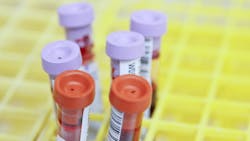Cardinal Health expands lab solutions to mitigate missed cancer screenings
Cardinal Health has announced cancer screening offerings from FUJIFILM Healthcare Americas Corporation and Polymedco. These screenings can be done either outside of a doctor's office or with less invasive procedures can help combat the increase in cancer-related deaths due to late-stage diagnoses from pandemic-related delays.
"The pandemic has changed the landscape of traditional diagnostic methods and is driving the healthcare industry to evaluate screenings differently," added Chris Kerski, general manager and senior vice president of Cardinal Health Laboratory Products. "We're adding new testing solutions to our portfolio to reduce barriers to screening and support patient-led cancer screenings."
According to a report in JAMA Oncology, nearly 10 million cancer screenings for breast, colon and prostate cancer were missed in the U.S. since the pandemic began. Researchers recently reported a more than 40% decline in colon cancer diagnoses alone during the pandemic, a statistic that points to missed screenings, not fewer cases.
During the pandemic, some health systems and health plans began proactively mailing screening collection kits to patients, rather than waiting for patients to come in for a routine visit or colonoscopy. Cardinal Health works with Polymedco to offer OC-AutoFIT, which detects small amounts of blood in stool – an early indication of colon cancer5. Different than a colonoscopy, patients don't have to prep in advance of the test and can do the stool specimen collection at home.
Liver cancer is one of the top-three leading causes of cancer-related deaths worldwide, accounting for more than 700,000 deaths each year.
In November 2020, Cardinal Health became a distributor of Fujifilm's innovative solution, the µTASWako i30 Immunoanalyzer System testing for liver biomarkers AFP-L3 and DCP using a simple blood draw. These biomarkers aid in the risk assessment of patients with chronic liver disease for the development of hepatocellular carcinoma (HCC), the most common type of liver cancer.
HCC surveillance is critical for those at-risk for liver cancer given its lethality. A recent study reported that liver cancer surveillance dramatically declined during the pandemic and that "a delay of just a few months in HCC surveillance may be catastrophic for patients, given that the doubling time for HCC tumor volume is 85.7 days." Only 20% of those patients at risk of developing liver cancer receive surveillance.
